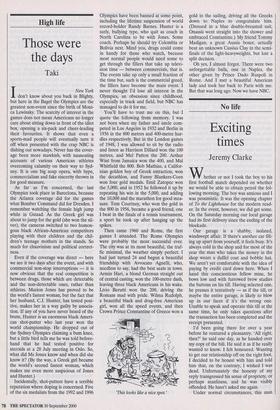High life
Those were the days
Taki
As far as I'm concerned, the last Olympics took place in Barcelona, because the Atlanta coverage did for the games what Bomber Command did for Dresden. I remember watching the female high jump while in Gstaad. As the Greek girl was about to jump for the gold (she won the sil- ver), the cameras switched to two humon- gous black African-American competitors playing with their children and the chil- dren's teenage mothers in the stands. So much for chauvinism and political correct- ness.
Even if the coverage was direct — here we see it two days after the event, and with commercial non-stop interruptions — it is now obvious that the real competition is between drugs, those which are detectable and the non-detectable ones, rather than athletes. Marion Jones has proved to be the world's fastest woman, but the fact that her husband, C.J. Hunter, has tested posi- tive, makes her in a way guilty by associa- tion. If any of you have never heard of the brute, Hunter is an enormous black Ameri- can shot-putter who last year won the world championship. He dropped out of the Sydney Olympics claiming a bum knee, but a little bird tells me he was told before- hand that he had tested positive for steroids at a 28 July meeting in Oslo. So, what did Ms Jones know and when did she know it? (By the way, a Greek girl became the world's second fastest woman, which makes me even more suspicious of Jones and Hunter.) Incidentally, shot-putters have a terrible reputation where doping is concerned. Five of the six medalists from the 1992 and 1996 Olympics have been banned at some point, including the lifetime suspension of world record-holder Randy Barnes. Hunter is a surly, bullying type, who quit as coach in North Carolina to be with Jones. Some coach. Perhaps he should try Colombia or Bolivia next. Mind you, drugs could come in handy for those who watch, because most normal people would need some to get through the fillers that take up televi- sion time — between commercials, that is. The events take up only a small fraction of the time but, such is the commercial greed, the fillers have become the main event. I never thought I'd lose all interest in the Olympics, an obsession since childhood, especially in track and field, but NBC has managed to do it for me.
You'll have to trust me on this, but I quote the following from memory. I was not born when my father and uncle com- peted in Los Angeles in 1932 and Berlin in 1936 in the 800 metres and 400-metre hur- dles respectively. But in the London games of 1948, I was allowed to sit by the radio and listen as Harrison Dillard won the 100 metres, and Mel Patton the 200. Arthur Wint from Jamaica won the 400, and Mal Whitfield the 800. Bob Mathias, a Califor- nian golden boy of Greek extraction, won the decathlon, and Fanny Blankers-Coen won four gold medals. Emil Zatopec won the 5,000, and in 1952 he followed it up by repeating his win in the 5,000, and adding the 10,000 and the marathon for good mea- sure. Tom Courtney, who won the gold in the 800 in 1956, became a good friend, one I beat in the finals of a tennis tournament, a sport he took up after hanging up the spikes.
Then came 1960 and Rome, the first games I attended. The Rome Olympics were probably the most successful ever. The city was at its most beautiful, the traf- fic minimal, the weather simply perfect. I had just turned 24 and begun a beautiful friendship with Awocato Agnelli, who, needless to say, had the best seats in town. Armin Hari, a blond German straight out of central casting, won the 100-metre dash, leaving three black Americans in his wake. Livio Berutti won the 200, driving the Romans mad with pride. Wilma Rudolph, a beautiful black and drug-free American girl, won all the speed events, and then Crown Prince Constantine of Greece won a `This looks like a nice spot.' gold in the sailing, driving all the Greeks down to Naples to congratulate him. (Dressed in a blue double-breasted suit, Onassis went straight into the shower and embraced Constantine.) My friend Tommy Madigan, a great Aussie boxer, actually beat an unknown Cassius Clay in the semi- finals of the light-heavyweights, but lost a split decision.
Oh yes, I almost forgot. There were two unforgettable balls, one in Naples, the other given by Prince Dada Ruspoli in Rome. And I met a beautiful American lady and took her back to Paris with me. But that was long ago. Now we have NBC.


























































































 Previous page
Previous page